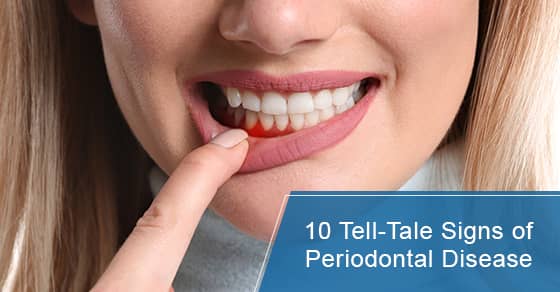
Periodontitis is a severe infection and inflammation of the gums which usually progresses over an extended period of time. It may start off with mild signs and develop into a more severe issue when left untreated. Your dentist will definitely look out for and diagnose signs of periodontal disease in your mouth.
When the bacteria that causes the disease accumulates for too long, the effects can be detrimental. This is why it’s also important for you to be able to tell what the early signs and stages of periodontal disease are. Keep reading to learn about some of the most common signs you should look out for.
1. Bad breath
While bad breath can be a sign that you are not brushing your teeth adequately, it can also be a symptom of an underlying issue such as periodontal disease. If you have persistent bad breath and you don’t know the reason, it’s a good idea to discuss this issue with your dentist. Even if it isn’t caused by periodontal disease, your dentist can make some recommendations to try and alleviate the problem and keep your mouth smelling and feeling fresh.
2. Loose teeth
Professional help is necessary when you begin to notice that your permanent adult teeth are looser than they should be. You should never be able to wiggle your teeth and brushing them should not cause any kind of movement either. If you suspect that you have loose teeth, this is definitely an issue to bring up with your doctor or dentist. They can take an in-depth look to assess what’s going on.
3. Sensitive gums
If you find that your gums are overly sensitive, it could be due to a possible infection. Look for redness, swelling or tenderness of your gums and around your gum line. If the problem persists, speak to your dentist about it as soon as possible.
4. Shifting teeth
This should not be happening. Although some people experience the shifting of their teeth after wearing braces or Invisalign, it’s uncommon for most people to experience shifting on a regular basis. If your teeth have shifted, discuss this with your dentist.
5. Bleeding
While some bleeding after cleaning your teeth can be normal, it’s not normal for this to be a regular experience after brushing your teeth or flossing. If this is a problem for you, it could signal a more serious issue. Talk to your dentist immediately to ensure that it isn’t just mild irritation that’s causing your gums to bleed.
6. Receding gums
Receding gums occur when the gums start to pull away from the teeth, revealing sensitive pockets that can harbour bacteria and plaque or tartar. Teeth will look longer due to receding gums which exposes more of the tooth. These areas can also be especially sensitive when brushing or flossing and during routine cleanings. Your dentist should be able to identify these areas immediately and prevent further damage and deterioration.
7. Excess plaque and tartar
When bacteria builds up around the teeth and gums, you will start to notice discolouration of the teeth in the form of plaque and tartar accumulation. Plaque that is left on the surfaces of the teeth can harden into tartar, which is sticky and not easy to remove. This is where your dentist will have to step in to remove stubborn tartar during your regular check-ups and cleanings.
8. Inflammation
Inflammation in the mouth and surrounding areas is indicative of periodontal diseases. You could also experience an inflammation response in other parts of the body.
9. Foul taste
Along with bad breath, those with periodontal disease often end up having a foul, metallic taste in their mouth as well. You may notice this bad taste on a regular basis. If this is something you experience, it is definitely worth discussing with your dentist or doctor who can take a further look.
10. Pain
Last but certainly not least, any pain in the mouth (gums, teeth, cheeks, etc.) is definitely a sign of periodontal disease. Those with the disease often complain about pain while chewing, talking or just in general. Let your dentist know about any pain or unusual feelings that you may be experiencing in your mouth as these could indicate underlying issues.
All in all, it’s important to practise good oral hygiene and see your dentist regularly in order to maintain a beautiful, healthy smile. Good oral hygiene starts at home and requires your care and attention, so do your best not to neglect your teeth and gums.
For more information on periodontics in Mississauga and the GTA, call Bristol Dental at 866-673-2109 or contact us here.


[…] 10 Tell-Tale Signs of Periodontal Disease […]